英语U1T3
仁爱英语八年级U1T3练习题及答案解析含听力

Unit 1 Topic 3(考试时间:90分钟,满分:100分)第一部分听力(20分)Ⅰ.听句子,选择正确图片。
每个句子读一遍。
(5分)( )1.( )2.( )3.( )4.( )5.Ⅱ.听句子,选择正确答语。
每个句子读一遍。
(5分)( )6.A.Sorry. It’s a secret. B.I am OK. C.I can’t tell you.( )7.A.No, I needn’t. B.No, thanks. C.Oh, you’re good.( )8.A.Yes, I would. B.Let’s go. C.Yes, I’d love to.( )9.A.Let’s make it half past two. B.At the school gate. C.Sometimes.( )10.A.It is windy. B.The wind. C.It will be windy. Ⅲ.听对话,判断正(T)误(F)。
对话读两遍。
(5分)( )11.Wang Fang is going to see a film.( )12.Li Kang will help Grandma Li.( )13.They will meet at three.( )14.Grandma Li’s son died.( )15.They will meet at Grandma Li’s home firs t.Ⅳ.听短文,回答问题。
短文读三遍。
(5分)16.Is Mike good at playing basketball?_____________________________17.When do Jack and Jim play basketball?_____________________________18.Which is Jack’s favorite basketball player, Yao Ming or Michael Jordan?_____________________________19.What do Mike and his friends do on Tuesday evenings?_____________________________20.Is Ronaldo Mike’s favorite football star?_____________________________第二部分基础知识运用 (55分)Ⅰ.单项选择。
u1-t3 仁爱九年级英语重点短语、句子汇总及语法精粹
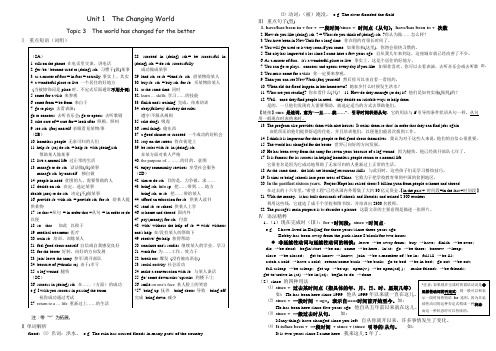
Unit 1 The Changing WorldTopic 3 The world has changed for the better Ⅰ. 重点短语(词组)注:带“*”为拓展。
Ⅱ.单词解析flood:⑴名词:洪水。
e.g. The rain has caused floods in many parts of the country.⑵动词:(被)淹没。
e.g. The river flooded the field. Ⅲ. 重点句子(型)1. have/has been in + for + 一段时间/since + 时间点(从句);have/has been to + 次数2. How do you like (doing) sth. ? = What do you think of (doing) sth. ?你认为做……怎么样?3. Y ou have been in New Y ork for a long time. 你在纽约有很长时间了。
4. Y ou will get used to it very soon if you come. 如果你来(这里),你将会很快习惯的。
5. The city has improved a lot since I came here a few years ago. 自从我几年来到这,这座城市就已经改善了不少。
6. As a matter of fact,it's a wonderful place to live. 事实上,这是个居住的好地方。
7. Y ou can go to plays,concerts and operas every day if you like. 如果你喜欢,你可以去看表演,去听音乐会或去听歌8. Y ou must come for a visit. 你一定要来参观。
9. Then you can see New Work (for) yourself. 然后你可以亲自看一看纽约。
仁爱版英语9年级上册u1t3笔记
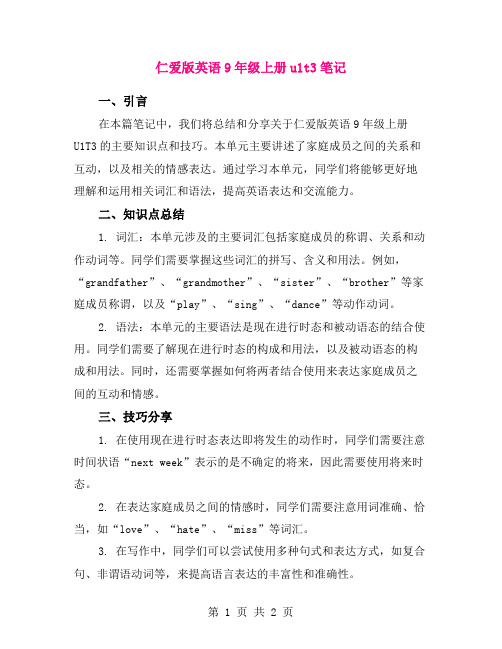
仁爱版英语9年级上册u1t3笔记一、引言在本篇笔记中,我们将总结和分享关于仁爱版英语9年级上册U1T3的主要知识点和技巧。
本单元主要讲述了家庭成员之间的关系和互动,以及相关的情感表达。
通过学习本单元,同学们将能够更好地理解和运用相关词汇和语法,提高英语表达和交流能力。
二、知识点总结1. 词汇:本单元涉及的主要词汇包括家庭成员的称谓、关系和动作动词等。
同学们需要掌握这些词汇的拼写、含义和用法。
例如,“grandfather”、“grandmother”、“sister”、“brother”等家庭成员称谓,以及“play”、“sing”、“dance”等动作动词。
2. 语法:本单元的主要语法是现在进行时态和被动语态的结合使用。
同学们需要了解现在进行时态的构成和用法,以及被动语态的构成和用法。
同时,还需要掌握如何将两者结合使用来表达家庭成员之间的互动和情感。
三、技巧分享1. 在使用现在进行时态表达即将发生的动作时,同学们需要注意时间状语“next week”表示的是不确定的将来,因此需要使用将来时态。
2. 在表达家庭成员之间的情感时,同学们需要注意用词准确、恰当,如“love”、“hate”、“miss”等词汇。
3. 在写作中,同学们可以尝试使用多种句式和表达方式,如复合句、非谓语动词等,来提高语言表达的丰富性和准确性。
四、练习与作业1. 完成课后练习题,检查自己对知识点的掌握情况。
2. 仿照本单元对话示例,尝试自己编写一段关于家庭成员之间互动的对话,提高口语表达能力。
3. 收集一些与家庭相关的英文文章或新闻,阅读并理解其中的生词和表达方式,加强词汇和阅读理解能力。
总的来说,仁爱版英语9年级上册U1T3是一个非常贴近生活的单元,同学们可以通过学习本单元掌握许多与家庭相关的词汇和语法,提高英语表达和交流能力。
在学习的过程中,同学们需要注重词汇和语法的积累,加强口语和写作练习,不断提高自己的英语水平。
仁爱版八年级英语上册U1T3

5.在世界上
5.in the world
6.每四年
6.every four years
7.轮流
7.in turn
8.全世界
8.all over the world
9.越来越受欢迎的 9.more and more popular
10.今后
10.in the future
11.有机会去做(某事1)1.have the chance to do sth
1.现代的
1.modern
2.奥林匹克运动会 2.Olympics
3.格言
3.motto
4.奥林匹克运动会的 4.Olympic
5.环形物,铃声
5.ring
6.象征
6.symbol
7.站立,忍受
7.stand
8.代表
8.stand for
9.最少
9.least
10.至少
10.at least
11.现今、现在
12.开会
12.have a meet
13.尽某人的全力 13.try one's best=do one's best
1.上周 2.举办一场运动会 3.首先做某事 4.尽某人最大努力 5.想成为 6.能够
st week 2.hold a sports meet 3.the first to do sth 4.do one's best 5.want to be 6.be abl part in=join in=be in
2.男子八百米
2.boys'800-meter race
3.我希望如此
3.I hope so.
4.为某人加油
4.cheer sb on
八上仁爱英语U1T3
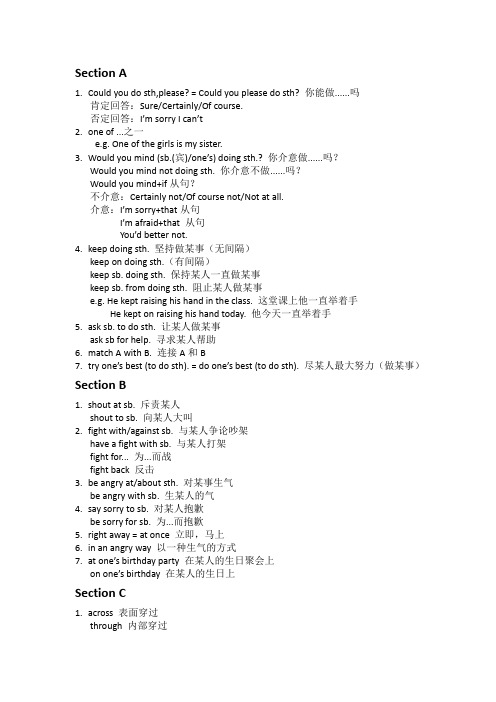
Section A1.Could you do sth,please? = Could you please do sth? 你能做......吗肯定回答:Sure/Certainly/Of course.否定回答:I’m sorry I can’t2.one of ...之一e.g. One of the girls is my sister.3.Would you mind (sb.(宾)/one’s) doing sth.? 你介意做......吗?Would you mind not doing sth. 你介意不做......吗?Would you mind+if从句?不介意:Certainly not/Of course not/Not at all.介意:I’m sorry+that从句I’m afraid+that 从句You’d better not.4.keep doing sth. 坚持做某事(无间隔)keep on doing sth.(有间隔)keep sb. doing sth. 保持某人一直做某事keep sb. from doing sth. 阻止某人做某事e.g. He kept raising his hand in the class. 这堂课上他一直举着手He kept on raising his hand today. 他今天一直举着手5.ask sb. to do sth. 让某人做某事ask sb for help. 寻求某人帮助6.match A with B. 连接A和B7.try one’s best (to do sth). = do one’s best (to do sth). 尽某人最大努力(做某事)Section B1.shout at sb. 斥责某人shout to sb. 向某人大叫2.fight with/against sb. 与某人争论吵架have a fight with sb. 与某人打架fight for... 为...而战fight back 反击3.be angry at/about sth. 对某事生气be angry with sb. 生某人的气4.say sorry to sb. 对某人抱歉be sorry for sb. 为...而抱歉5.right away = at once 立即,马上6.in an angry way 以一种生气的方式7.at one’s birthday party 在某人的生日聚会上on one’s birthday 在某人的生日上Section C1.across 表面穿过through 内部穿过2.重点句型:It’s adj. for(of) sb. to do sth. 做某事对某人来说......3.so that 为了,以致于so...that... 太...以至于...4.短语:invent sth. for sb. 为...发明...come into being 形成,产生at first 起初have/get the skill 有/得到技术as a team作为一个团队5.over = more than 超过under = less than 少于6.both A and B A和B都both of... ...都7.follow/obey the rules 遵守规则break the rules 违反规则8.run with sth. 和...跑run away 逃走run out 用完,耗尽run a firm 运营一家公司run after 追赶9.around the world = all over the world 全世界10.a small number of 少量的the number of ......的数量a number of 大量的.......11.t hrow around 乱扔throw away 扔掉throw litter 扔垃圾throw sth. 扔某物Section D1.change sth. into sth. = turn sth. into sth. 把...变成...2.point 指,点,得分point out 指出point to 指向(远处物体)point at 指向(近处物体)score point 得分two point twenty five 2.25on this point 就这点而key point 重点3.重点句子:How do the players score point?运动员们如何得分?What’s the structure of the passage?文章的结构是什么?。
仁爱英语七年级U1 T3

(2) Be+主语+ year(s) old? Yes, 人称代词+be. / No, 人称代词+be+not. eg: Are you 12 years old? Yes, I am. / No, I’m not. Yes, we are. / No, we aren’t. eg:Is she/he 12 years old,too? Yes, she/he is. / No, she/he isn’t. eg: Is Kangkang/your friend 12 ? Yes, he is. / No, he isn’t.
Unit 1 topic 3 How old are you?
1.基数词的表达
11-19: eleven, twelve, thirteen, fourteen, fifteen, sixteen, seventeen, nineteen, 20以上: twenty, twenty-one, … thirty …forty…fifty…sixty…seventy …eighty…ninety…hundred
4. (1)-What grade +be动词+主语+ in? -主语+be动词+Grade+数字. …在哪个年级? eg: -What grade are you in? -I’m / We’re in Grade Seven. -What grade is Maria in? -She is in Grade Nine. -What grade are they in? -They are in Grade Three?
5.单数 (1) - What’s +this / that/ it? - It’s a / an… eg: -What’s this? -It’s a pen. -What’s that? -It’s an apple. (2) -Is this/ that/ it a /an…? -Yes, it is. /No, it isn’t. eg: -Is this a book? -Yes, it is./No, it isn’t. -Is that an eraser? -Yes, it is./No, it isn’t.
九年级上册英语u1t3知识点
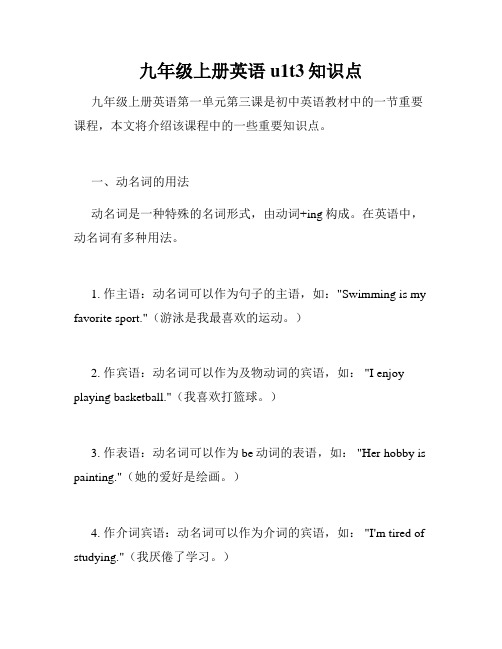
九年级上册英语u1t3知识点九年级上册英语第一单元第三课是初中英语教材中的一节重要课程,本文将介绍该课程中的一些重要知识点。
一、动名词的用法动名词是一种特殊的名词形式,由动词+ing构成。
在英语中,动名词有多种用法。
1. 作主语:动名词可以作为句子的主语,如:"Swimming is my favorite sport."(游泳是我最喜欢的运动。
)2. 作宾语:动名词可以作为及物动词的宾语,如: "I enjoy playing basketball."(我喜欢打篮球。
)3. 作表语:动名词可以作为be动词的表语,如: "Her hobby is painting."(她的爱好是绘画。
)4. 作介词宾语:动名词可以作为介词的宾语,如: "I'm tired of studying."(我厌倦了学习。
)5. 作状语:动名词可以作为动词的状语,如: "He went home, singing happily."(他唱着快乐地回家了。
)二、动词不定式的用法动词不定式是由to+动词原形构成的,也具有多种用法。
1. 作为宾语:动词不定式可以作为及物动词的宾语,如: "I want to visit my grandparents."(我想去看望我的祖父母。
)2. 作为目的状语:动词不定式可以表示一个目的状语,如:"I'm here to help you."(我来这里是为了帮助你。
)3. 作为结果状语:动词不定式可以表示一个结果状语,如:"He studied hard to pass the exam."(他努力学习以通过考试。
)4. 作为形容词补语:动词不定式可以作为形容词的补语,如:"I'm happy to see you."(见到你我很高兴。
七年级下册英语U1T3知识点

七年级下册英语U1T3知识点七年级下册英语U1T3是一个重要的学习阶段。
本篇文章主要介绍该阶段的知识点,分为以下几个方面。
1. 人称代词人称代词包括主格和宾格,主格用于代替主语,宾格用于代替宾语。
如:I(我)/ me(我)、you(你)/ you(你)、he(他)/ him(他)等。
2. 句型转换在学习英语语法时,我们需要经常进行句型转换。
例如,将陈述句转换为疑问句,需要在句首加上助动词,将动词放在主语前面。
如:She is a teacher.(陈述句)→ Is she a teacher?(疑问句)3. 常用动词在英语中,常用动词有很多。
例如:do(做)、go(去)、come(来)、eat(吃)、drink(喝)、see(看)、write(写)、read(读)、listen(听)、speak(说)等。
学生们需要牢记这些动词的基本用法。
4. 做状语的副词和短语在英语语法中,副词和短语往往用来做状语。
例如:often(经常)、usually(通常)、sometimes(有时)、always(总是)、in the morning(在早上)、on weekends(在周末)等。
学生们需要掌握这些常用副词和短语。
5. 一般现在时一般现在时是英语中最基本的时态之一。
它表示现在一个动作的状态或习惯。
例如:I go to school every day.(我每天都去上学。
)在学习这个时态时,我们需要掌握动词的变化规则。
6. 一般过去时在英语中,一般过去时表示过去的某个时间里发生或存在的事情。
例如:I came to this city last week.(我上周来到这个城市。
)学生们需要学习动词在过去时的变化规则。
7. 语态英语中有两种语态——主动语态和被动语态。
主动语态是指句子的主语执行动作,而被动语态则是指句子的主语接受动作。
例如:She reads books every day.(主动语态)→ Books are read by her every day.(被动语态)学生们需要学习这两种语态的用法和变化规则。
英语八上U1T3知识点

八年级上unit 1 topic 3 知识点1.talk abut 谈论2. take part in =join in =be in 参加(活动)3. The boys’ 800-meter race 男子800 米比赛4.cheer sb on 为…加油5.宾从I’m sure the sports meet will be exciting .6. exciting /excited +ing 的修饰物 +ed 的修饰人7.It’ the first time to do sth 这是第一次做某事8.have fun doing sth 做某事很高兴 have a lot of fun9.do one’s best=try one’s best +to do sth 10.make friends with sb 与某人交朋友 11.shall 用于第一人称What shall we take ? 12. Let’s=Let us +动原13.let’s make it +时间让我们定在几点 14.at the school gate /the theater /bus stop 15.a symbol of 一个…的标志 16. Stand for 代表 17. at least 至少 18. be +过去分词被动语态 are held 被举办They are both held every four years . 19. every four years 每四年 every other 每隔 every other four years 每隔四年、每五年20.by different countries 被不同的国家 21. in turn 轮流 22. more and more popular 越来越受欢迎 23. have a chance to do sth 有机会做某事 24. hold the Olympics 举办奥运 25.hold – held feel-felt win –won run - ran 26. win the first place 赢得第一名 27.do badly in sth 在某方面做得不好(do well in 反义词)28.cross the finish line 跨过终点线 29. exercise 锻炼(不可数)但是注意morning exercises / eye exercises 这两个词用复数 30.some day 某一天(表将来) 31. be able to do sth 能做某事 32.catch up with sb 跟上,赶上某人 33.neck and neck 齐头并进。
仁爱英语九年级 U1T3知识点

九年级unit 1 考点解析Topic 3一、词组Section Aget used to 对........习惯used to be/do 过去曾经是/过去常常as a matter of fact 事实上on the phone 在电话里go to plays 去看表演go to concerts/operas 去听音乐会/歌剧)come for a visit 来参观Section Bhomeless people 无家可归者 a normal life 正常的生活in need 在困难时,在贫困中decide on 决定,选定provide sb with sth 提供某人某物feel good about 对.....感觉良好not only....but also 不仅...而且in order to 为了thanks to 由于,幸亏because of 由于medical treatment 治疗,医疗Section Cbe famous for 因....而著名return to 回到,恢复到at the same time 同时obey strict rules 遵守严格的规定take drugs 吸毒,吃药talk about 谈论receive a good education 接受良好教育have/live a happy life 过快乐的生活at home and abroad 国内外pay for 为....而付钱Project Hope希望工程without the help of 没有...的帮助make a speech 发表演讲二、语言点详解Section A1.how do you like sth / doing.....?=what do you think of..... 你认为(做).....怎么样?动名词作like的宾语。
你认为长城怎么样?2.get(be) used to 意为“习惯于”。
九年级仁爱英语上册第一单元第三话题课文翻译

九年级仁爱上册U1 T3世界已经变得更美好了四文译九年级仁爱上册U1 T3 Section A译文1a(海伦和鲍勃正在通过电话交谈)海伦:你已经在纽约很长一段时间了,你在那里居住怎么样?鲍勃:它是很棒的,我真正地喜欢它。
海伦:但是我听说那里的交通很可怕,几乎所有的人开车太快了。
鲍勃:哦,如果你来,你将会很快习惯于它的。
海伦:我也听说街道是脏的。
鲍勃:他们以前是,但自从几年前我到这里以来,这座城市已经改善很多。
海伦:那里不会危险了吗?鲍勃:呃,过去纽约是危险的,但是现在很安全了。
事实上,它是一个居住的好地方。
我们有美丽的公园,良好的学校,著名的博物馆和优秀的餐厅。
如果你喜欢你每天都能去戏院、音乐会和歌剧院。
你一定要来参观,这样你就可以亲自看看纽约。
九年级仁爱上册U1 T3 Section B译文1a玛丽亚:你正在看什么,简?简:我正在看一张来自加拿大的报纸,马丁出示我一个有趣的文章。
它是报道关于一个帮助无家可归的人的组织。
玛丽亚:加拿大有无家可归的人吗?简:哦,是的。
很多国家有无家可归的人。
这篇文章说一个城市有下美妙的机构。
自从它成立以来,它已经帮助成百上千的人重返工作岗位,过着正常的生活。
玛丽亚:那听起来棒极了!他们如何管理呢?简:呃,一旦他们发现需要帮助的人,他们就会选择行当的说方式去帮助他们。
玛丽亚:这些无家可归的人能获得足够的食物和医疗吗?简:是的,而且不仅仅那样。
这个组织同样提供他们房子,培训他们以便他们能再次找到工作。
玛丽亚:我认为让这些人自我感觉良好这是很重要的。
简:你是对的,世界已经变得更美好了。
九年级仁爱上册U1 T3 Section C译文1a埃德蒙顿的一个著名组织帮助无家可归的人很多年了,它叫埃德蒙顿社区服务,它因成功帮助无家可归的人重返正常生活而闻名。
它帮助无家可归的人获得工作,借钱给他们,以便他们能租到房子,为他们的孩子们购买衣服。
这个组织有一个叫“流浪儿之家”的专门机构,。
八年级上册U1T3知识点

八年级上U1T3P171. the school sports meet 学校运动会2. take part in+活动“参加……”=join in+活动=be in+活动例:I’ll be in the relay race.3. the boys’ 800-meter race 男子800 米赛跑4. excited“兴奋的” ,指人对……感到兴奋Sb.be excited about sth. 对…感到兴奋;The fans are very excited about the excitingsoccer game.exciting “令人兴奋的,使人激动的” (事物本身让人兴奋激动)用法:一般情况下,是人作主语,用V.-ed;物作主语用V.-ing类似形容词:be interested in和interestingbe bored with和boringbe surprised at和surprising4 have fun 玩得开心,过得愉快have fun(in)doing sth.做某事有乐趣5. prepare for 为……作准备The farmers are preparing for the next year.6. It’s one’s first time to do sth.某人第一次做某事It’s her first time to visit this museum.7. make friends with sb.与某人交朋友8. a pair of 一双running shoes 跑步鞋sports shoes 运动鞋P191. Which sport will you take part in?2. Let’s make it half past six.就定在六点半吧。
3. shall①与I 和we 连用,用于疑问句,表示建议或征求意见Shall I take my camera?我带相机好吗?Good idea!好主意!②=will=be going to 表将来4. go to the movies 去看电影go for a picnic 去野炊5. catch up with 追上;赶上6. neck and neck 并驾齐驱7. run into(使)碰撞8. cross the finish line穿过终点线9. P211.a symbol of…“…的象征”2.stand for 代表……3.at least至少4.一般现在时的被动语态结构:am/is/are+动词的过去分词They are both held every four years.他们都是每四年被举办一次。
仁爱英语九上U1T3词组总结

词组总结(U1T3)1. 一个居住的地方 a place to live2. 来看一看come for a visit3. 大量,成百上千万millions of4. 过着正常的生活live a normal life5. 处于困境中in need6. 自我感觉良好,有自信feel good about oneself7. 以多种方式in many ways8. 拾起,捡起,(开车)接人pick up9. 帮助某人摆脱(困境)help sb out10. 无家可归的人the homeless11. 离开be away (from)12. 人类最基本的需求the most basic human needs13. 短时间 a short period of time14. 从一个地方搬到另一个地方move from one place to another15. 养家keep a home16. 有毒品问题have a problem with drugs17. 有精神疾病have a mental illness18. 故意地,有意地on purpose19. 把…视为…think of … as …20. 根据according to21. 做得够do enough22. 一项帮助学生的计划an education program to help students23. 中国的贫困山区the poor parts (areas) of China24. 为…做出贡献make a contribution to (doing sth)25. 德育发展moral development26. 现代意识modern thinking27. 结果as a result28. 尊敬师长respect teachers29. 相互,彼此one another。
九年级英语u1t3短语句型重点知识点整理全面

1.数千/数百万2.习惯做3.过去经常做4.被用来做5.事实上6.有需要的7.决定、选定8.决定做某事9.做决定10.帮助某人摆脱困境11.把…视为/看作12.故意、有意13.提出、想出14.起作用、有影响15.赚钱16.结果17.作者的意图18.为…做贡献19.过上正常的生活20.鼓励某人21.做…的重要性22.继续做23.根据、依据24.设法做成…25.(不)能够做26.拾起/捡起、开车接某人27.代表、象征28.很长时间29.自从两年前以来30.下定决心做某事1.You have been in Beijing for a long time.2. The city has improved a lot since I came here a few years ago.3. What are you doing?--I'm reading a newspaper.4. Since it started, It has helped hundreds of people return to work and live a normal life.5. Once they find people in need, they will decide on suitable ways to offer them help.6. The program provides job training for them so that they can find jobs again.7. Whatever the difficulty was, he never give up.This spirit encouraged me a lot.8. Would you like to join us?---Yes,I'd like to。
9. You're right./ I agree with you.10. Would you like to go to the library with me this weekend?---Yes I'd love to。
仁爱版英语七年级上册u1t3知识点
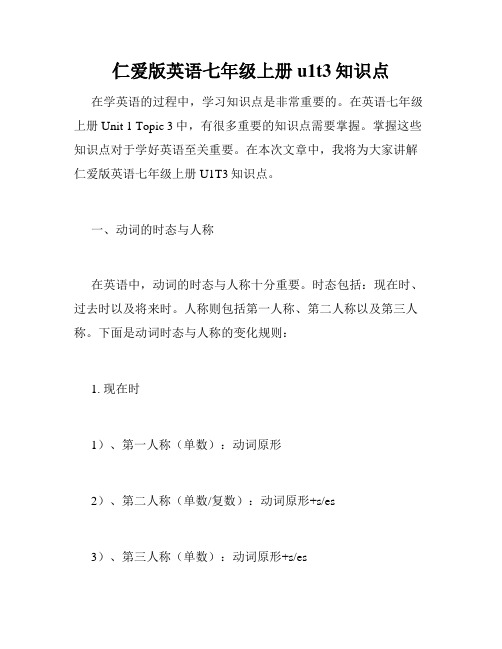
仁爱版英语七年级上册u1t3知识点在学英语的过程中,学习知识点是非常重要的。
在英语七年级上册Unit 1 Topic 3中,有很多重要的知识点需要掌握。
掌握这些知识点对于学好英语至关重要。
在本次文章中,我将为大家讲解仁爱版英语七年级上册U1T3知识点。
一、动词的时态与人称在英语中,动词的时态与人称十分重要。
时态包括:现在时、过去时以及将来时。
人称则包括第一人称、第二人称以及第三人称。
下面是动词时态与人称的变化规则:1. 现在时1)、第一人称(单数):动词原形2)、第二人称(单数/复数):动词原形+s/es3)、第三人称(单数):动词原形+s/es2. 过去时1)、所有人称:动词过去式3. 将来时1)、所有人称:will+动词原形二、形容词与副词的基本用法在英语中,形容词描述名词的特征,而副词描述动词的特征。
下面是形容词与副词的基本用法:1. 形容词1)、描述名词的特征:如大、小、好、坏等。
2)、修饰不定代词:如something、everything、nothing等。
3)、可用来比较:如good-better-best、big-bigger-biggest等。
2. 副词1)、描述动词的特征:如快慢、好坏等。
2)、能修饰形容词:如非常好、非常漂亮等。
3)、能修饰其他副词:如非常慢、非常快等。
三、一般现在时的用法一般现在时用于描述现在的情况或通常情况下的情况。
下面是一般现在时的用法:1. 描述现在的情况如:I am a student. 我是一名学生。
2. 描述通常情况下的情况如:She often eats pizza at home. 她经常在家吃披萨。
3. 描述客观事实或永恒真理如:The sun rises in the east and sets in the west. 太阳从东边升起,从西边落下。
四、动词的否定形式在英语中,否定形式是一种权宜之计,是指“不做某事”或“没有某物”。
下面是动词的否定形式:1. 加not如:I do not like ice cream. 我不喜欢冰激凌。
U1-T3总结

可数名词复数变形规则: (1) 在一般情况下直接在词尾加-s, 例如: desk---desks pen---pens pencil---pencils car---cars apple---apples teacher---teachers (2) 以-s, -x, -ch, -sh 结尾的单词, 在词尾加-es, 例如: watch(手表)--- watches class(班级)--- classes box (盒子)--- boxes bus(公共汽车)--- buses (3) 以辅音字母+y结尾的单词,去掉y加ies baby---babies country---countries (4) 以fe或者f结尾的单词,去掉fe或者f加ves knife---knives shelf---shelves
an apple. 1.This is an orange?—Yes,it is. 2.--Is it 3.—What is this?—It is a pen. 4.—Are you a student?—Yes ,I am. 5.—What is that ?—It is an English map. 6.Miss Wang is an old teacher. a red apple. 7.He has 8.That is an orange dress.
one two three four + teen = five six + teen = seven + teen = eight nine + teen = ten
eleven twelve thirteen fourteen fifteen sixteen seventeen eighteen nineteen twenty
仁爱英语八年级上册U1T3重要知识点单词短语句型汇总
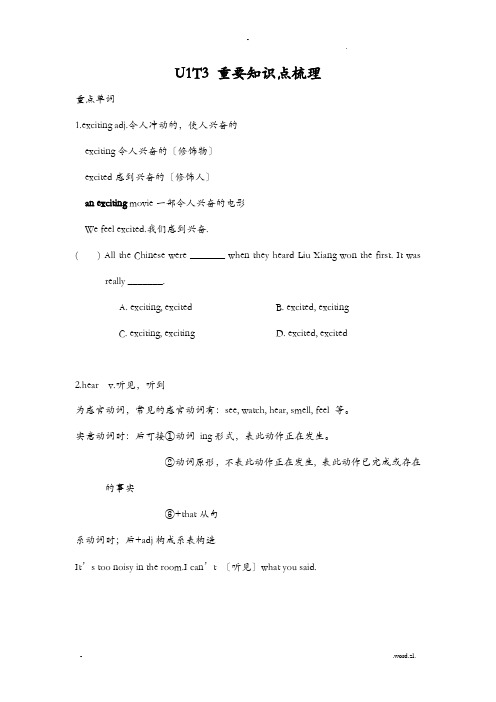
U1T3 重要知识点梳理重点单词1.exciting adj.令人冲动的,使人兴奋的exciting令人兴奋的〔修饰物〕excited感到兴奋的〔修饰人〕an exciting movie一部令人兴奋的电影We feel excited.我们感到兴奋.( ) All the Chinese were _______ when they heard Liu Xiang won the first. It was really _______.A. exciting, excitedB. excited, excitingC. exciting, excitingD. excited, excited2.hear v.听见,听到为感官动词,常见的感官动词有:see, watch, hear, smell, feel 等。
实意动词时:后可接①动词ing形式,表此动作正在发生。
②动词原形,不表此动作正在发生, 表此动作已完成或存在的事实③+that从句系动词时;后+adj构成系表构造It’s too noisy in the room.I can’t 〔听见〕what you said.3.Shall modal v.好吗?要不要……?Shall+动词原形--S we go to the zoo tomorrow?-- Good idea.4.message n.信息,消息leave a message 留下消息take a message 〔打时用〕传个话,留口信Linda isn’t in.Can I take the m for her right away?5.theater n.剧场,戏院How about listening to a concert at a t ?6.line n.线;线条;线路The l is bad.I can’t hear you.Could you please speak louder?7.modern adj.现代的In m times,almost every family has a puter at home.8.Olympics n.奥林匹克运动会9.ring n.环形物;铃声v.打;〔钟,铃等〕响There is a beautiful r on herfinger(手指〕.10.stand v.站立;位于;忍受;承受stand for 代表,容忍stand up起立Hk stands for Hong Kong.I’m not standing for the way he speaks.I can’t _______ the environment here.我不能忍受这里的环境。
- 1、下载文档前请自行甄别文档内容的完整性,平台不提供额外的编辑、内容补充、找答案等附加服务。
- 2、"仅部分预览"的文档,不可在线预览部分如存在完整性等问题,可反馈申请退款(可完整预览的文档不适用该条件!)。
- 3、如文档侵犯您的权益,请联系客服反馈,我们会尽快为您处理(人工客服工作时间:9:00-18:30)。
1.She is only telling a white lie. 2.A tidy tiger tied a tie tighter to tidy her tiny tail.
/ כI/ 唇型由圆唇变为扁唇。
1.The toy belongs to the boy. 2.I was annoyed by the noise. 3.One man’s meat is another man’s poison.
+ +
three hundred
3.Teach how to read the numbers from 100-999
100 one hundred / a hundred 101 one hundred and one 十位数与个位数 102 …… 之间用连字符连 103 …… 接,百位数之后 185one hundred (and) eighty-five 用and连接十位 186 …… 数或个位数, 187 …… hundred 之前如 315three hundred (and) fifteen 果有具体数字时 316 …… 不加s。 317 …… 999 nine hundred (and) ninety-nine
2.Teach the numbers from 20-90
money
How much is it?
It’s ten yuan.
+
+
How much is it? It’s twenty yuan. thirty forty fifty sixty seventy eighty ninety
How much is it? It’s one/a hundred yuan. It’s two hundred yuan.
..\憨豆先生动画系列03-240x192.mp4
English Vowels
元音
/i:/ 舌尖抵下齿。舌的两侧抵住上齿的
两侧。
例句 1. We need to clean our teeth every evening. 2. It is not good to eat too much meat.
1.We haven't met for seven years. 2 .She was arrested because of theft.
/æ /
舌尖抵下齿,舌前部稍抬起, 比/e/低,开口比 /e/大些,双唇向两旁 平伸,成扁平形。
1.I’m very glad to know that Jack is back. 2. Don’t let the cat out the bag.
bananas
a pear
pears
a strawberry
strawberries
a tomato
tomatoes
a hamburger
hamburgers
broccoli
salad
ice cream
ቤተ መጻሕፍቲ ባይዱ
French fries
法国的
Read them again:
bananas
pears
/ O / 上下唇呈圆形,
舌微升,
1.It's beyond my knowledge. 2.There is something wrong with my watch.
/u:/
上下唇呈圆形并向前 突出,舌后部上升,轻触软 腭。
例句 1.Look at those cool shoes!
/ u / 舌后部向软腭抬起,舌尖
/ /:כ唇部紧张,双唇收的更圆更
小,发长音。
1.My daughters are all tall. 2.He was born on August the fourteenth ,nineteen forty-four.
/ә/ 舌中部稍抬起,牙床半开, 双唇扁平。该音俗称懒音.
1.The wonderful weather was over. 2.Different countries have different customs.
/ eI / 口形由[e] 向[I]滑动,发音过程中下
颚向上合拢,舌位也随之稍稍抬起。
1.I'll take the blame for being late. 2.The manager made a big mistake in the deal.
/ aI / 发音时舌尖抵住下齿。
发音过程中,下颚迅速向上 移 动,开口逐渐缩小。
2.Count the numbers from 0-20
Step2 Revision
1.Recognize the numbers from 0-20.
Step3 Presentation
1.Learn the numbers from21-29.
21 22 23 24 25 26 27 28 29 twenty-one twenty-two twenty-three twenty-four twenty-five twenty-six twenty-seven twenty-eight twenty-nine
/з:/ 嘴唇微张,放松,舌尖稍稍向上
齿龈抬起,用力发出声音。
1.We search for the bird which he heard in the church. 2.You'd better not go back on your word.
/α:/ 口型自然张大,但不成
圆形。
1.It’s hard to start the car. 3.Six sharp smart sharks. (鲨鱼)
/uә /
发音过程中嘴唇由稍 圆而展开。
He is cruel to the poor.
..\国际音标发音表.swf
不定冠词a (an)与数词one 同源,是"一个" 的意思。a用于辅音音素前,一般读作[ә], 而an则用于元音音素前,一般读做[en]。
an orange
oranges
a banana
离开下齿,舌头放松。
1.Have a good look at the cookery book.
English diphthongs
双元音和单元音的最根本的区别是:双元音 在发音过程中有一个从前一个音向后一个音 的滑动过程,通常前长后短,前重后轻,口 型和舌位要随之变化。双元音一律作长音处 理。
/Λ/
舌尖轻抵下齿,上下唇张 开成扁型。
1.It’s fun to run and jump in the sun 2.Double bubble gum bubbles double
/α:/ 口型自然张大,但不成
圆形。
1.It’s hard to start the car. 3.Six sharp smart sharks. (鲨鱼)
tomatoes
strawberries
salad
broccoli
hamburgers
French fries
ice cream
Do you like……? Yes, I do. No, I don`t.
字母读音
1、带有/i:/读音的字母有B,C,D,E,G,P,T,V,Z 2、带有/e/读音的字母有F,L,M,N,S,X,Z 3、带有/ei/读音的字母有A,H,J,K 4、带有/ai/读音的字母有I,Y 5、带有/ju:/读音的字母有Q,U,W 6、带有/a:/读音的字母有R 7、带有/әu/读音的字母有O
/ I / 嘴稍收回,舌前部稍放低, 短促。
Six sick hicks nick six slick bricks with picks and sticks.
六个生病的乡下人用锄头和棍子在六 块光滑的砖块上刻上痕迹。
/e/ 舌尖抵下齿,舌前部稍抬起,
上下齿间可容纳一个食指尖,口型自 然放松,双唇稍扁。
3.Let’s
chant !
0到12很基础,打好基础要记住; -teen 13-19有特点,________来帮助; 20,30至90,_____结尾记牢固; -ty ′thir′teen, ′thirty分清楚; 几十 前轻后重是十几,前重后轻是____; 百元大钞hundred,一百两百不用复(数); 几十几、几百几,—(连字符)、and不可丢; 这些你都记牢了,就能数到999。
/ әu /
口腔由扁至圆,类似汉语 中的“欧”。
1.I need to blow my nose.(擤鼻涕) 2.East or west, home is the best. 3.There is no smoke without fire.
/ au /双唇逐渐收成圆形,舌位
由高到低。
1.Do you know how to open an account? 2.Do not be a big mouth to what I have told you.
例句
/ Iә /发音时用扁平唇,嘴不要张得太大。
1.I clearly hear a knock at the door. 2.He lives near here.
/ eә /先发前元音/e/,同时舌
尖轻触下齿;然后很快 滑向/ә/音;发音过程中双唇半 开。
1.There‘s a bear on the loose in this area.
What can you see one
two
three
1
2 10 12
six
ten
3 4 5
6
twelve
7 11 8 9
four five
